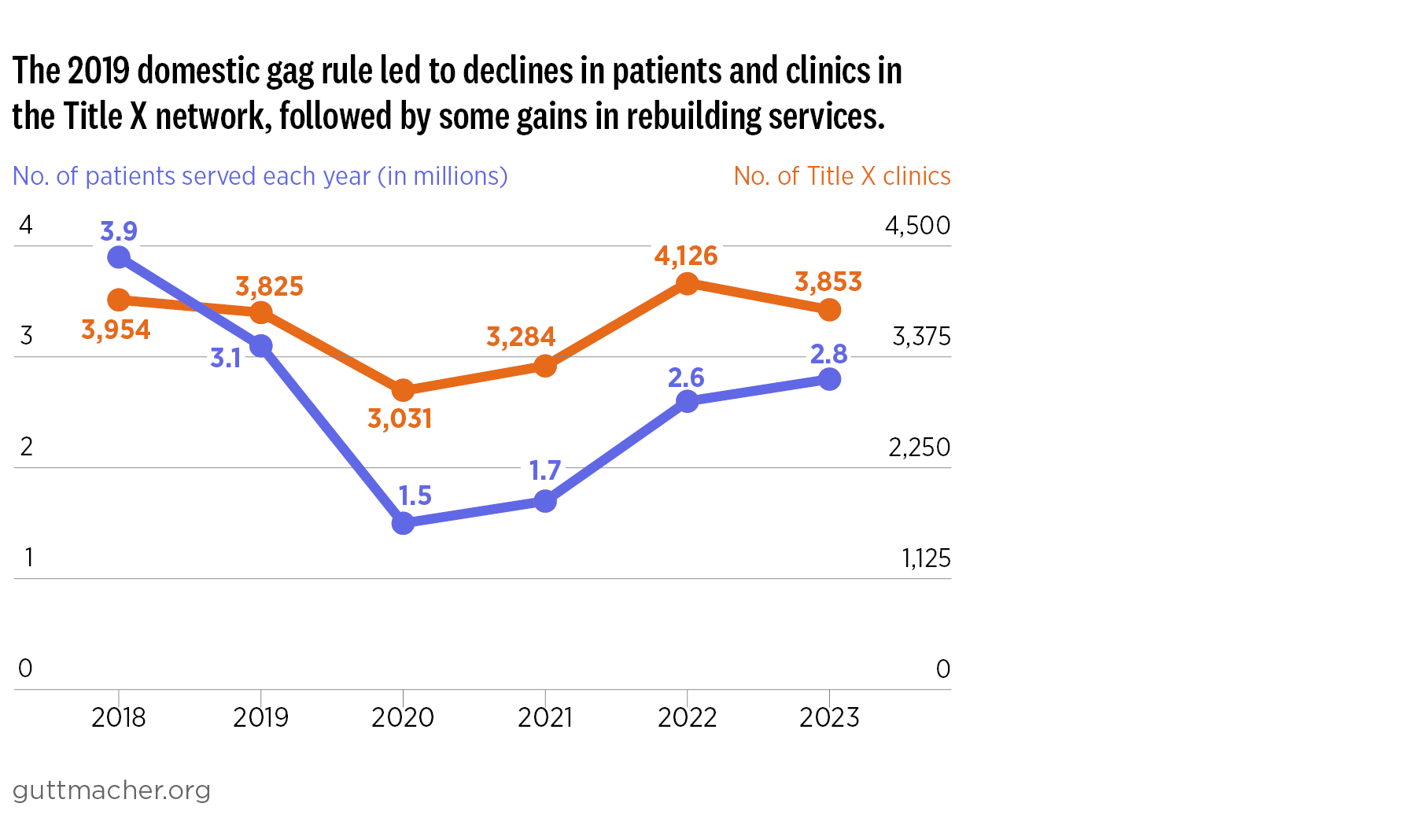Since the disruptions of the 2019 Title X Final Rule and the COVID-19 pandemic, Title X providers and clinics have been working hard to regain stability and fully serve their communities. Under a presidential administration hostile to sexual and reproductive health and rights, policies such as reinstating the Final Rule or cutting funding once again threaten the program’s stability and core mission of providing equitable reproductive health care and preventive health care to underserved populations. The program could face erosion of provider networks, regressive regulations and broader ideological attacks that could limit the delivery of reproductive health services to marginalized communities.1 However, there are steps policymakers can take to address Title X’s funding challenges and protect the program from further attacks.
Funding Gaps
Title X has faced long-standing challenges because of chronic underfunding and ongoing attempts to defund the program entirely.2 Congress has funded Title X at approximately $286 million annually, which has not increased since 2015.3 In a recent study, federal agencies indicated that Title X would require $1.38 billion annually to adequately serve patients.4 With flat funding from Congress and inflation, this gap has continued to grow, further exacerbated by the increasing demand for family planning services.3 This funding gap has significantly constrained the program’s ability to expand services to meet growing demand. Current funding levels are also inadequate to maintain current service levels, especially in the wake of increased restrictions on reproductive health care following the 2022 US Supreme Court decision (Dobbs v. Jackson Women’s Health Organization) that revoked the federal constitutional right to abortion.
Damage to Title X Under the Domestic Gag Rule
The Trump-Pence administration’s 2019 Title X Final Rule, or “domestic gag rule,” destabilized the Title X program, undermining its ability to provide comprehensive reproductive health care.5 While in effect from 2019 to 2021, the rule prohibited abortion referrals and mandated that all pregnant patients receive referrals to prenatal care; required Title X grant recipients to physically and financially separate funded services from any abortion-related activities, including referrals and counseling; and redefined “family planning” to include abstinence, adoption and fertility awareness–based methods.
The negative effects were both immediate and far-reaching. Between 2019 and 2020, the number of patients served by Title X clinics dropped dramatically, from 3.1 million to 1.5 million. According to the Office of Population Affairs, 63% of this decrease was directly tied to the implementation of the domestic gag rule; disruptions caused by the COVID-19 pandemic were responsible for the remaining 37% decrease.6 Entire states (Hawaii, Maine, Oregon, Utah, Vermont and Washington) had no Title X–funded clinics for nearly two years, while 11 additional states had dramatic reductions in the number of available providers.7
Research revealed that the domestic gag rule affected both clinics that chose to stay and those that left the Title X network, limiting their services and provision of person-centered care beyond what was dictated by the policy.8 Not surprisingly, this research also found that the gag rule’s restrictions trickled down and negatively impacted individuals’ experiences with care. These harmful effects fundamentally undermined Title X’s core mission of ensuring access to a broad range of family planning services.
Rebuilding the Title X Network
While the Biden-Harris administration reversed the gag rule in 2021, the damage to the Title X network still lingers. Despite slow but steady gains in the number of people being served since the low point in 2020, access to comprehensive care remains fragile in many places, with significant gaps in service availability due to lingering provider hesitancy and operational disruptions.5
Source: Killewald P et al., 2023 Family Planning Annual Report: National Summary, Washington, DC: OPA, HHS, 2023, https://opa.hhs.gov/sites/default/files/2024-10/2023-FPAR-National-Summ….
Potential Effects of Gag Rule Reinstatement
If reinstated, the domestic gag rule would once again force Title X–funded clinics into a difficult position: either refuse federal funding or forgo their ability to provide patients with the comprehensive, patient-centered care that they would otherwise provide. The harm of reinstating the rule would extend beyond immediate service disruptions. By restricting referrals for abortion, the rule compromises the principle of person-centered care and erodes trust between patients and health care professionals. Restrictions on reproductive health care undermine reproductive autonomy, further deepening existing disparities in health outcomes, particularly for those in marginalized groups who already encounter systemic barriers to health care access.8 Ultimately, reinstating the domestic gag rule would exacerbate existing disparities in reproductive health outcomes and undermine the equitable delivery of care that Title X was designed to provide.
Actionable Steps to Secure Title X in a Changing Landscape
Title X faces many new and ongoing threats. In order to meet those threats and emerge stronger in the future, policymakers must address funding challenges and protect the program from further attacks that would weaken it. Rather than constraining the reach of Title X, policymakers should take decisive action to strengthen Title X and its ability to ensure equitable access to health care.
- Congress must fully fund Title X to enable the program to meet the growing demand for affordable, high-quality reproductive health services. At the same time, anticipating potential federal funding cuts, states should commit to bridging funding gaps with their own funds to ensure that essential services continue uninterrupted even if federal resources fall short.
- The Trump-Vance administration and Congress should resist efforts to reinstate harmful policies such as the domestic gag rule, which undermined provider-patient communication and forced many clinics out of the Title X network.
- Policymakers should pass right to contraception legislation at both the federal and state levels in order to safeguard reproductive autonomy.9 Legislation would ensure universal access to birth control options, independent of political shifts or judicial decisions that threaten to limit reproductive rights.
- Ensure that person-centered care remains a cornerstone of Title X’s mission, thus respecting individuals’ autonomy, preferences and needs.

